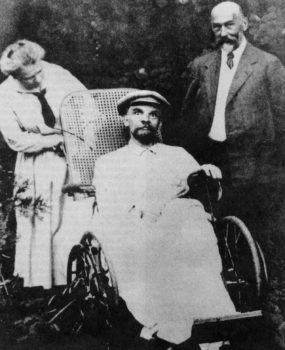This translated twitter thread purports to originally come from an FSB source, but I cannot say if this is legit or not. If true, it is dynamite.
|
|||||
|
I have lost loads of followers over my comments on Ukraine. Victory to Ukraine! A sentiment I strongly share. The West’s Green delusions empowered Putin. While we banned plastic straws, Russia drilled and doubled nuclear energy production. I’ve seen this idea expressed a couple of times in the last day. Here’s Nigel Farage:
The Daily Sceptic, which is really branching out now that most Covid-related restrictions have ended – and in ways I tend to agree with – has a whole article speculating that Putin is paranoid about his health and further speculating that this has sent Putin a bit mad. I don’t think we have to assume a lunatic in the Kremlin to explain what is going on. Imagine for a minute, you are a Russian imperialist. You have no time for this democracy crap. You have no time for this self-determination crap, or this international law crap. You regard it as Russia’s manifest destiny to rule over Ukraine, Belarus, the Baltic States and a few other places. You look at your opposition, the West. These are people who are bankrupt. They argue about whether men should be allowed to use women’s toilets. They have elites who despise the populations they govern and the customs and traditions that made their countries strong. They have universities that have become communist re-education camps. They fritter away their prosperity on wind farms and useless railways and welfare. They spend little on defence and when they do it is mostly on making sure that their forces embrace diversity. Almost all of them are to a greater or lesser extent dependent on your natural resources. And the “leader” of this rabble is at best a stubborn, wishy-washy, incompetent. And you say to yourself “Why shouldn’t I go to war? Who is going to stop me?” P.S. Having drafted this I tuned into YouTube to find that David Starkey has made much the same point but much more eloquently than I ever could.
That’s Konstantin on Triggernometry’s YouTube on Ukraine. Lots of good, thoughtful stuff on Putin, Western weakness and everything in between. Well, not so much on that country in between, you know, Ukraine which is all the more remarkable when you consider that Konstantin has Russian-speaking family there. But, as he says, he doesn’t think people in the West are particularly interested in what is best for Konstantin’s family. Update Maybe that title (see comments) should be toned down. I am seeing a phenomenon being floridly expressed today, but it is something I have observed for many years: nothing happens in the world, at least nothing good, unless the malign USA is driving it. Yes, the United States is the richest, most powerful nation on earth and it has been since World War II. And yes, it has interfered under presidents of all stripes in pursuit of its perceived geopolitical interests. It has done this for good or ill in a great many places, sometimes benignly, other times with a breathtaking lack of judgement. But just as the leaders of that great nation often overestimated the USA’s ability to impose its will in far away lands, many people in many places also overestimate America’s influence in world affairs. They largely deny that locals have agency, oblivious to the fact people everywhere are capable of organising politically in ways not directed and driven from an agency in Langley, Virginia. As a friend of mine who was deeply involved in the 2014 Maidan revolt in Kyiv said to me once:
He was of course joking, but Maidan was a golden example of how something overwhelmingly driven and executed by Ukrainians, in Ukraine, in response to Ukrainian political and social pressures becoming intolerable, was nevertheless written off as CIA mischief-making. That idea was pushed hard by Russia when their pet oligarch was deposed, and it is entirely possible Putin even believes it himself. It is actually more supportive of his worldview than the notion it really happened because millions of Ukrainians loathed Putin, hated his Ukrainian puppet in Kyiv, and reject the malign influence of Russia generally. But so many people seek a simpler world, a bipolar one in which everything is down to the Big Actors (with America still the biggest at the moment). Understanding that and feeding into it grants profound insight into Russian (and to some extent Chinese) propaganda. Add to that the rightly shattered confidence in Western institutions the last two years has wrought, and it is not surprising otherwise discerning folk fall for it. Many seek to explain the world through the distorting prism of the Americocentric delusion, rather than face the complex frequently fracturing mosaic that explains the world more accurately. People do things locally for local reason; not everything is about some current iteration of the Great Game. If the USA (and UK) have a share of blame for what is happening in Ukraine right now, it is not because they ‘provoked’ Russia: Putin has made it clear the very existence of a politically and culturally independent Ukraine is intolerable to him. No, their mistake, their toxic involvement, was when they pressed Ukraine into surrendering the nuclear weapons Kyiv inherited from the defunct USSR in return for meaningless guarantees. Russia is not attacking Ukraine in response to actions of the USA since then, that’s an Americocentric delusion. This is not happening because Ukraine wanted to join NATO, it’s happening because they are outside NATO, which is not the same thing at all. Russia is not driven by fear of NATO strength, it is driven by perceptions of western weakness. Russia believes the cultural, military and geopolitical balance has tipped in their favour, expecting the west will respond to their invasion of Ukraine today with nothing more than official grimaces. I hope they are not correct about that but we will soon see. Putin is motivated by oft stated imperial ambitions to Make Russia Great Again, to ‘restore’ Russia to its imperial boundaries with Moscow as the New Rome (yes, they really say that); Ukrainian rejection of that notion and assertion of their own identity is therefore intolerable. But reject ‘the Russian world’ they did, because Ukrainians do not wish to be ruled from the Kremlin even indirectly. That is why they overthrew Russia’s favoured oligarch and sought to chart their own course in the world. That is what this war is about. George Orwell, Animal Farm:
(Credit to, um, www.marxists.org actually, for providing the link.) The Times yesterday, “Donald Trump praises Vladimir Putin’s ‘genius’ move on Ukraine”. The headline worked; there are more than a thousand outraged comments about how Trump is “supporting Putin”. I knew before I read the first line that the point he was actually making would be something along the lines of this:
The BBC, this morning: From the Guardian, no less (and it doesn’t mince its words):
OK, readers may ask, what’s with the energy independence headline? Well, as sometimes noted, countries such as Germany (and now Belgium) have cut back on their use of nuclear energy. Germany is a big consumer of Russian natural gas, and that reliance is going to increase via the Nordstream 2 pipeline, assuming Berlin presses ahead in the teeth of rising criticism. This gives more power to the Russian state, and to Mr Putin. In the UK, recently Shell, the energy group, decided not to go ahead with widening its North Sea oil extraction efforts, and the business of fracking in the UK is stymied. There appears zero support by the Boris Johnson administration for the UK to aggressively develop any home gas/oil sectors further. For brave little Britain, apparently, we can shrug off the winter chills and Russian nastiness with windmills, solar panels, and noble sentiments. Forgive my sarcasm, but you get the point. Western countries appear, at least on the face of it, to favour energy policies that appear guaranteed to embolden and strengthen regimes such as that of Putin’s Russia. It’s as if it was intended. Earlier today, at the Historic Photos Twitter feed, I encountered this photo, of Lenin: Here is how Historic Photos describes the state Lenin had arrived at, when this photo was taken:
I have read many things, including many books, about Lenin and his sayings and doings, yet I have never come across this photo until now. That could be me, just not having noticed it. But I think there’s a reason why this particular piece of Lenin imagery has not done much circulating. There is still fierce disagreement about Lenin and his impact upon history. Many still revere him, as the man who set in motion the most serious attempt to overthrow capitalism that has so far happened on this planet, and many others detest the man for the same reason, and for the disgusting brutality with which he set about doing this. Some think Lenin (good) was “betrayed” by Stalin (bad). Others, such as I, think that Lenin (bad) started what Stalin (bad) carried on doing. But what all of us, on all sides of such debates, agree about is that Lenin was a very important and very consequential figure, who had a lot to say for himself and who did a lot to shape the course of history, for good or for bad. However, in the above photo, we see Lenin in a state of utter impotence, looking downright comical. And that’s surely why this photo doesn’t get out much. Either Lenin had immense power and did hugely important and noble things or he had immense power and did monstrously evil things, but whatever he was he was certainly not a joke. If those of us with things to say about Lenin, one way or the other or yet another, wish to decorate our judgments about Lenin with a photo of the man, the above photo is not going to be the one that any of us would choose. To generalise, images of historic figures get circulated a lot, or not, depending on whether they illustrate how we already think of them. The world’s cameras spit out a daily torrent of portraits of the great, the good and the bad, and it is in the editorialising process, when the “best” images are selected and the rest put aside, that the camera is made to tell a particular sort of story. This is surely an important way that cameras lie, or at the very least mislead, although there are of course others. Image googling confirmed my hunch. If you go here and keep scrolling down, you will scroll down in vain if you wish to see the above “historic” photo, or any others resembling it. No, all you will get are pictures and graphic recreations of Lenin being anything but “paralyzed and completely mute”. |
|||||

All content on this website (including text, photographs, audio files, and any other original works), unless otherwise noted, is licensed under a Creative Commons License. |
|||||




